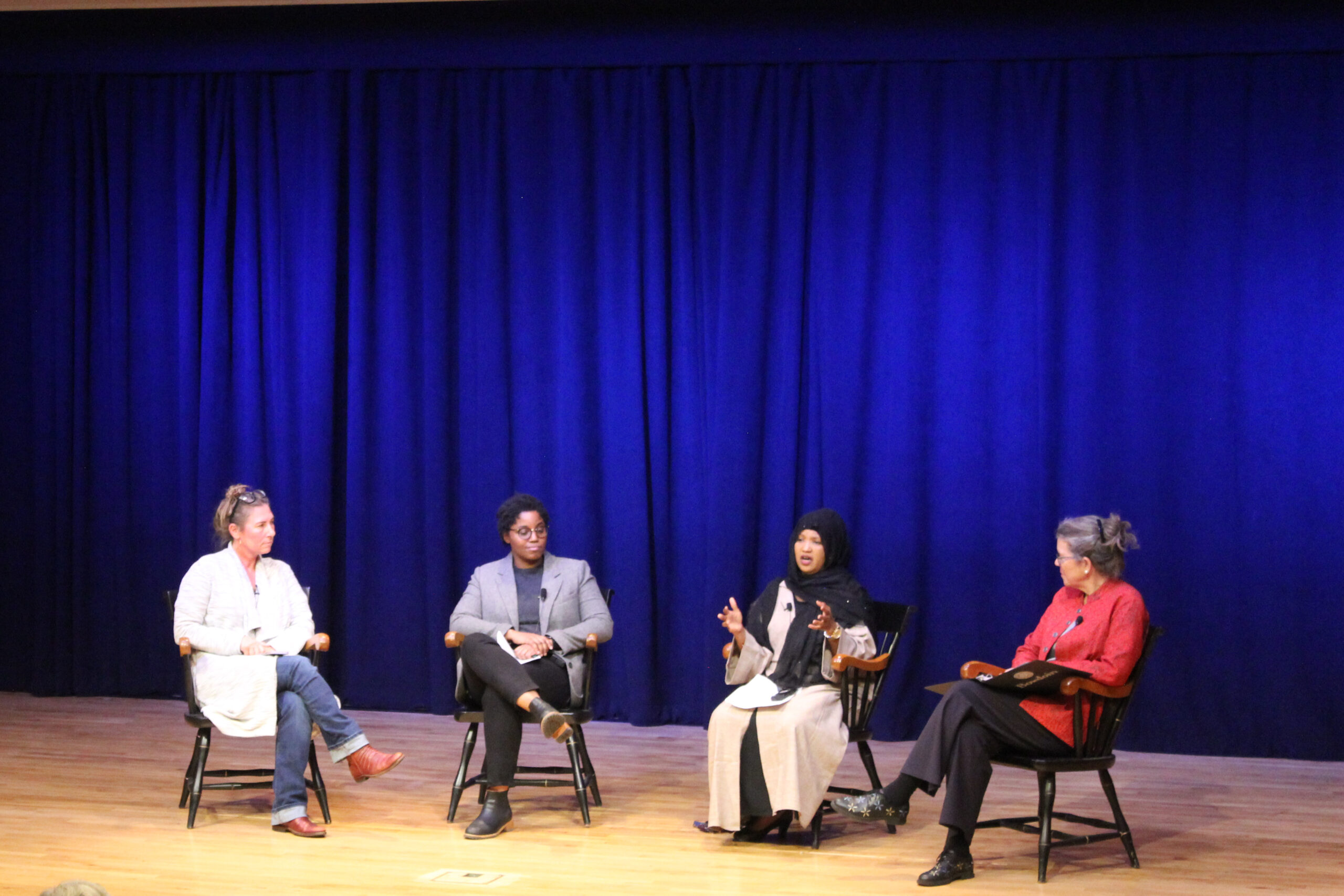McKeen Center hosts panel on the personal migration experience
November 1, 2024
 Carolina Weatherall
Carolina WeatherallLast Friday, the McKeen Center for the Common Good hosted a panel titled “Roots and Belonging: A Conversation on Migration” in Kresge Auditorium. The panel included Assistant Professor of Sociology Jamella Gow, Founder and Executive Director of Immigrants Resource Center of Maine (IRCM) Fatuma Hussein H’17 and Executive Director of Safe Passage Erin Mooney and was moderated by Associate Director for Public Service Wendy Van Damme.
The panel began with each speaker sharing their own experience with migration and how it has influenced their work. Mooney discussed growing up in the Salinas Valley region in California and witnessing the discrimination her friends and their parents—often agricultural workers from Mexico and Central America—faced, especially in regard to a lack of quality medical care. Hussein discussed her own experience as a refugee from war-torn Somalia and how it has affected her and her children to this day.
“Migration, to me, is survival.… You migrate, and you survive,” Hussein said. “You migrate, and you make the best out of what you get.… I don’t know how to explain the little pieces of life that you have to pick up and move on as if everything is right and okay, because all of your identities, your extended family, what you know, is suddenly gone, and then when you come here, this becomes your community.”
For Gow, her identity as the daughter of Jamaican migrants and upbringing in North Florida has influenced her research, which focuses on migrants from the Caribbean navigating stigmatization through race and xenophobia.
“I look at Caribbean migrants, because right now, they’re the largest Black migrant population and really the most visible,” Gow said in an interview with the Orient. “Immigration is really important for the Black community. I think part of my role is to emphasize that, not as a way to kind of distinguish Black migrants from other migrants, but to say, look, these are points of connection.… I [want] to emphasize, ‘Let’s not see this as a point of division. Let’s see this as a point of potential solidarity.’”
In an interview with the Orient, Van Damme echoed the importance of centering the talk around personal experience and how that could allow the audience to step away from the political aspect of migration.
“I was hoping that we would have a topic that’s out there that can be seen as political, seen instead as something personal that varies enormously from community to community, from individual to individual and that we could talk about what did fit under the umbrella of that term migration, roots and belonging,” Van Damme said. “And also share experiences that were very specific to those different communities and the experts that were giving voice to that.”
When discussing their professional experiences with migration, the speakers emphasized the effects of colonialism trickling down to many countries’ struggle with lack of resources, the emergence of civil wars and other inhumane circumstances that force people to leave their home country.
Mooney noted the civil war that broke out in Guatemala left many communities in poverty, especially Indigenous communities. Safe Passage—the organization Mooney works with—focuses on providing education and care for youth who live in a “garbage dump community” where families rely on the dump to sustain themselves and pay the municipality for the right to enter the dump.
“The garbage dump community is a really great example of the systemic exploitation and barriers that create the necessity to migrate for many of the folks that we work with,” Mooney said.“It’s an urban Indigenous community. Most families in the zones where we work came from rural communities … [that] have been systematically under-resourced by a non-Indigenous government who controls the resources and decides where teachers go, where doctors go, where bureaucrats go.”
During the Q&A session, the panelists defined the terms often used to describe the migrant experience—refugee, asylum, asylee and immigrant—and pointed students to ways they can get involved in helping migrant communities in Maine. Hussein discussed her work in the IRCM and mentioned opportunities to volunteer at the Welcome Center in Brunswick. Gow encouraged students to research candidates for local government because many of their policies directly affect the lives of refugees residing in Maine.
Audience member Mari Silvano Blay ’25 expressed appreciation for the guidance the panelists provided for getting involved on the local level.
“I’m very shocked to hear that [Brunswick is] an immigrant hub, especially because it is so far from the southern border…. I’ve learned recently that [Maine] is one of the more welcoming states,” Blay said.
Gow hopes the audience gained a perspective rooted in empathy and will try to understand the individual rather than solely focus on the political side of migration.
“It’s very easy to not see people either who are migrants or perceived as migrants, as human, and that leads to these really harsh policies that have been part of our nation’s history for a long time,” Gow said. “We’re seeing that both in Trump’s comments about Puerto Rico [and] even how Palestinians are depicted in the news. I think it’s so important to realize that this rhetoric is associated with real policy that actually impacts real lives.”

Comments
Before submitting a comment, please review our comment policy. Some key points from the policy: